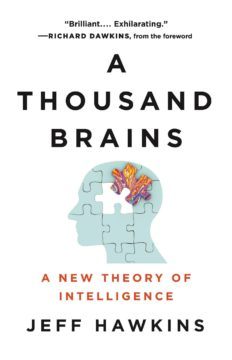by Charlie Huenemann
Today is July 4th, a day when Americans reflect on the value of freedom and the costs and sacrifices required for it. So it is an appropriate day to reflect on America’s deepest political aspirations.
 Nah. Let’s talk about our brains. The neocortex is where all our fancy thinking takes place. The neocortex wraps around the core of our brain, and if you could carefully unwrap it and lay it flat it would be about the size of a dinner napkin, and about 3 millimeters thick. The neocortex consists of 150,000 cortical columns, which we might think of as separate processing units involving hundreds of thousands of neurons. According to research at Jeff Hawkins’ company Numenta (and as explained in his fascinating recent book, A Thousand Brains), these cortical columns are capable of modeling patches of our experience (he calls them “reference frames”) and setting our expectations of what we should experience next, at any given moment. [Note: the remarks that follow are inspired by Hawkins’ book, but shouldn’t be taken as a faithful representation of it.]
Nah. Let’s talk about our brains. The neocortex is where all our fancy thinking takes place. The neocortex wraps around the core of our brain, and if you could carefully unwrap it and lay it flat it would be about the size of a dinner napkin, and about 3 millimeters thick. The neocortex consists of 150,000 cortical columns, which we might think of as separate processing units involving hundreds of thousands of neurons. According to research at Jeff Hawkins’ company Numenta (and as explained in his fascinating recent book, A Thousand Brains), these cortical columns are capable of modeling patches of our experience (he calls them “reference frames”) and setting our expectations of what we should experience next, at any given moment. [Note: the remarks that follow are inspired by Hawkins’ book, but shouldn’t be taken as a faithful representation of it.]
The neocortex’s complexity is considerable, but not infinite, and what’s most surprising is that such a relatively small network—you can fold it up and put it in your head—is capable of understanding calculus and making up jaunty little tunes and comparing Kierkegaard to Heidegger, not to mention doing all three in a single afternoon.
It’s hard to believe that the wide world of human thought can come from such a comparatively small albeit complicated structure, and my guess is that it doesn’t. It’s not that I believe in a soul or immaterial mind or anything like that, but I think that probably there is a lot less going on in our thinking than we think there is. Our thinking and our experience is extremely gappy, and we spackle over the gaps with a paste of fictions, supplied mainly through language and culture.
 Our thinking in this way is like digital recording of music. As any vinylphile will tell you—and at great length—lots of sound is lost in a digital recording. A digital file gives you chunky pixels of sound, and your expectations smooth over the gaps and fill in the nuance. A lot of what you hear, we might say, is just in your head. Another example would be a powerful optical illusion which itself contains no motion, no ghostly black dots, but we add the motion or the dots because, basically, our cortical columns are tricked into thinking those things should be there. We strongly expect them to be there, and so we think we see them there.
Our thinking in this way is like digital recording of music. As any vinylphile will tell you—and at great length—lots of sound is lost in a digital recording. A digital file gives you chunky pixels of sound, and your expectations smooth over the gaps and fill in the nuance. A lot of what you hear, we might say, is just in your head. Another example would be a powerful optical illusion which itself contains no motion, no ghostly black dots, but we add the motion or the dots because, basically, our cortical columns are tricked into thinking those things should be there. We strongly expect them to be there, and so we think we see them there.
If this suspicion is correct, then there is a lot less depth and coherence to our experience than we think there is. Our ordinary experience isn’t all that different, really, from the impoverished experience of someone whose cognitive abilities have declined. You may have been around a person who is no longer capable of a fully fluid and adaptive life, a life in which changes are recognized and behavior is modified swiftly and intelligently in response. These people can execute a narrow range of “pre-recorded” functions—they can make the coffee, tell the same story, and get the mail from the box, but that’s pretty much all they can do. They might even follow these scripts repeatedly all day if no one stops them, since it is all they have in their repertoire. In the moment, everything may seem in order to them. But take them into the middle of an amusement park or to a transit center and they will be entirely helpless, for they have no script they can apply to the situation.
We are pretty much in the same condition. It’s just that our range of scripts is wider and we transition more fluidly to different scripts as new circumstances present themselves. The smartest person you know might still be utterly helpless and bewildered if dropped into the middle of Tambwe-Sapo or into a Las Vegas rave. But for most of us most of the time, we have cognitive maps available for nearly every circumstance we are likely to encounter—because our brains have grown up in them and have developed in response to them. Still, there are limits for all of us.
This is true not just for being dropped into geographical locations but also for being dropped into all sorts of cognitive situations: thinking about the legacy of colonialism, working through a problem in quantum mechanics, practicing piano, learning Sanskrit, etc. We know the moves to make in the spaces we find ourselves in. Just as you could probably figure out a likely place to find a convenience store if dropped into downtown Pittsburgh, you know the plausible things to say when you find yourself dropped into a conversation about freedom and its costs. In each case you might experience some initial failures and dead-ends, but it won’t be long before that humming predictive engine between your ears develops more promising and successful avenues, at least as judged by your partners in conversation.
The upshot of all this is that our minds are always busy shifting from one sort of script or model to another—and sometimes running several at once—and we don’t notice all this discontinuity because some other script is running, one whose task it is to smooth out and integrate our behavior into a continuous narrative story that is mostly fiction. We are the ones making the coffee, telling the same old stories, getting the mail from the box, writing an essay for 3 Quarks, telling ourselves along the way that there is some coherent trajectory being followed by some fictional entity named “I”. But it’s an army of semi-autonomous drones, each executing one sequence or another, in response to the environments our bodies find themselves in. We learn how to talk about ourselves as if we are single, autonomous, unified individuals, but we’re not. So it’s fiction.
The exciting thing about reading books like Hawkins’ A Thousand Brains is the power they have to change how you view your own thinking. My own experience is that I am growing more conscious of just what a mess I am, engaged in every moment with several minor different activities, like a group of unruly children being led through a park. If anyone stops me and asks what I am doing, I can come up with some acceptable story—or rather, one of the voices present in my little swarm can offer up an answer. But why think that voice has the authority to speak for the swarm? There’s both more and less to thinking than meets the I.
